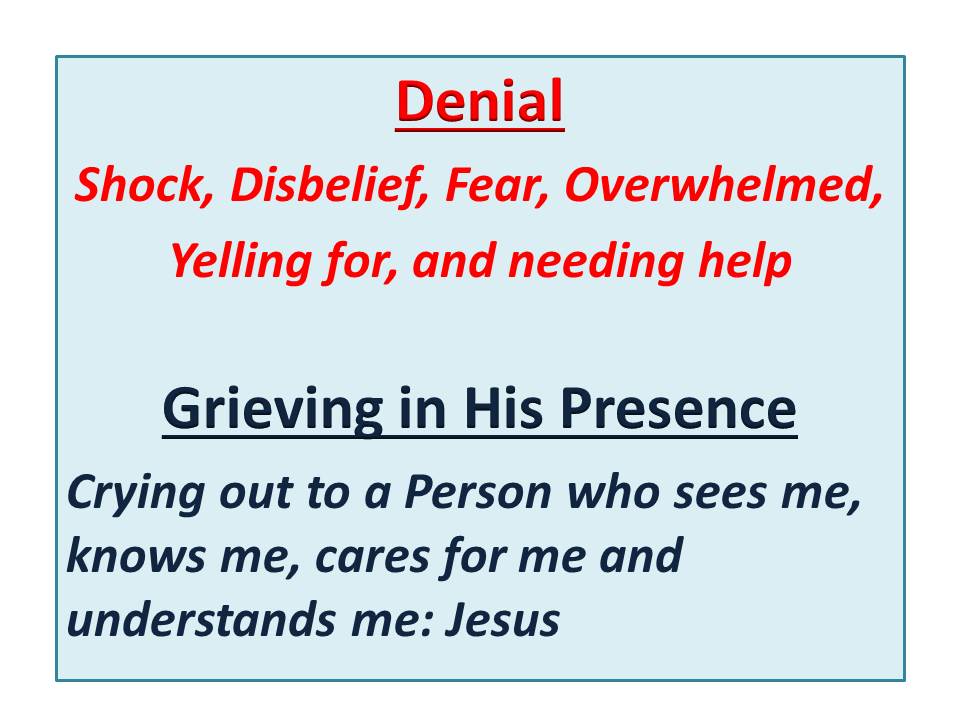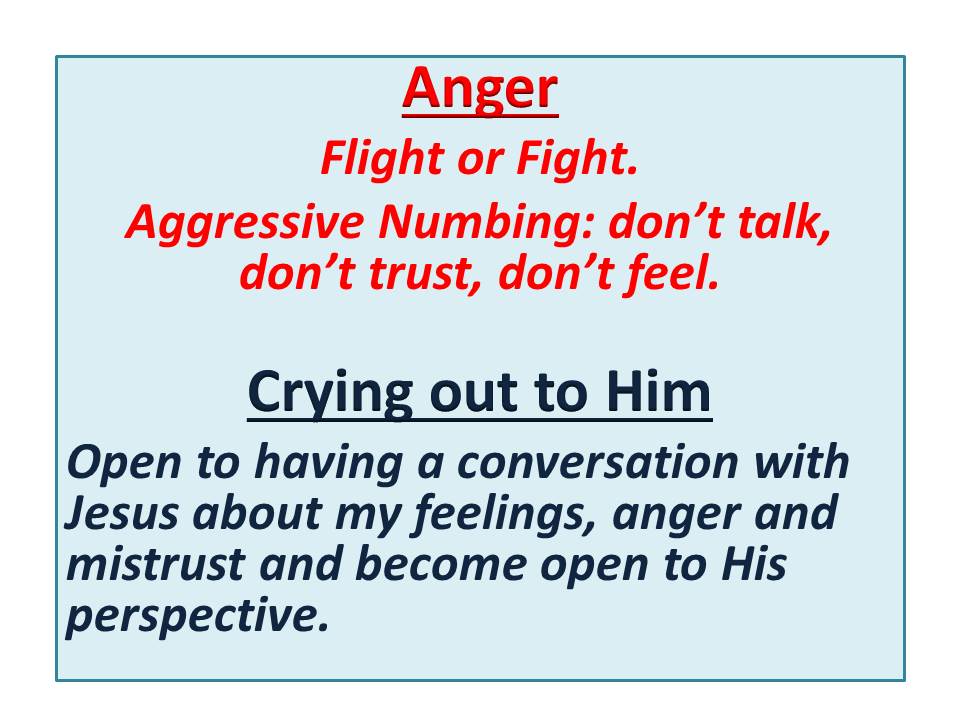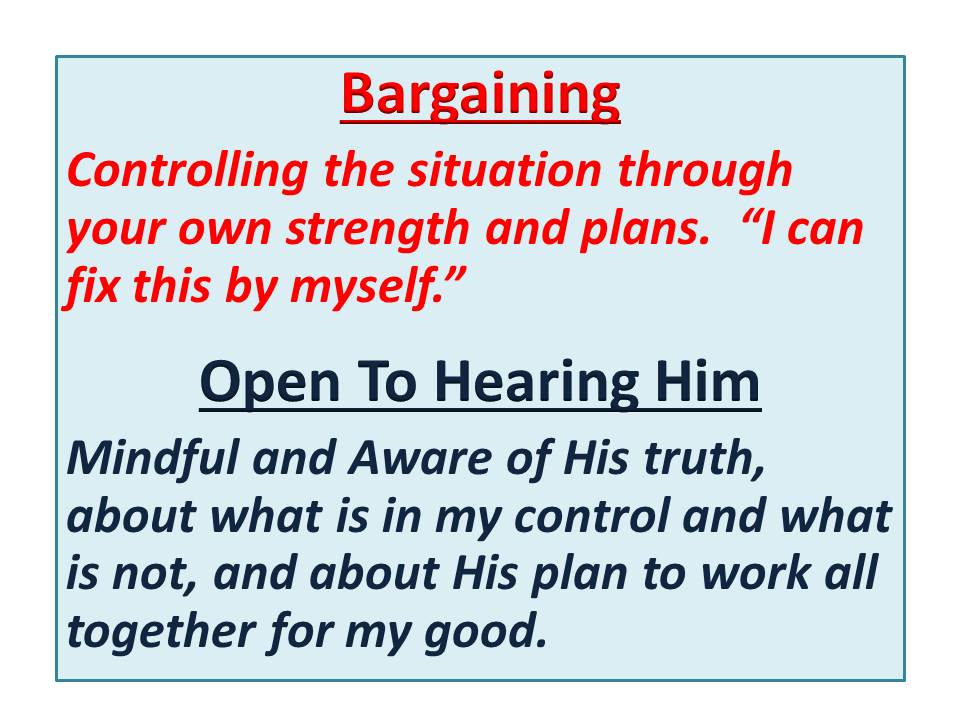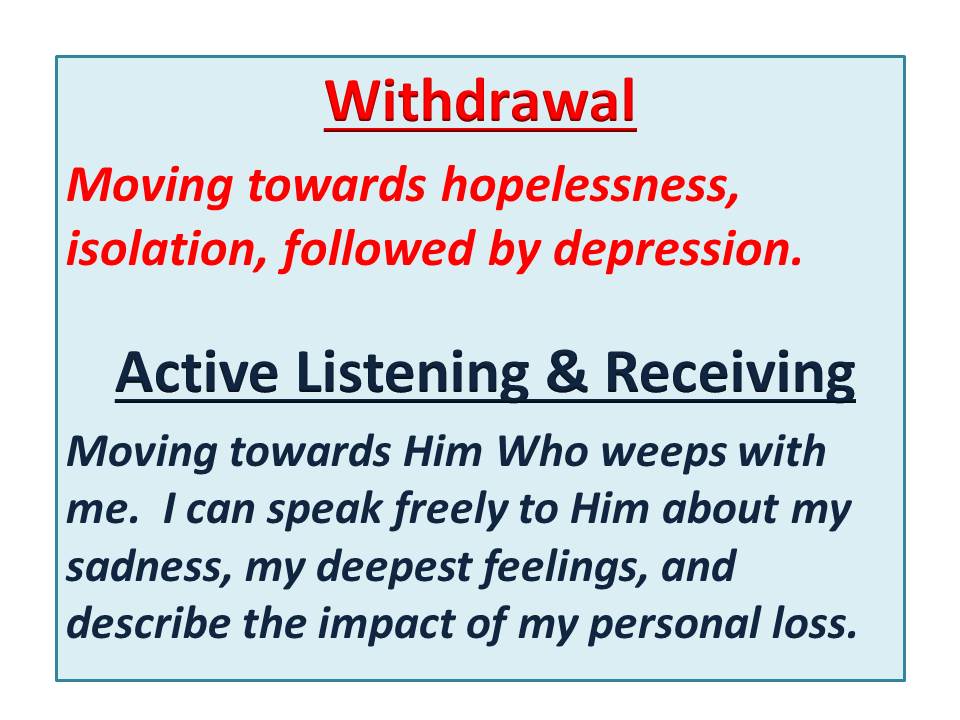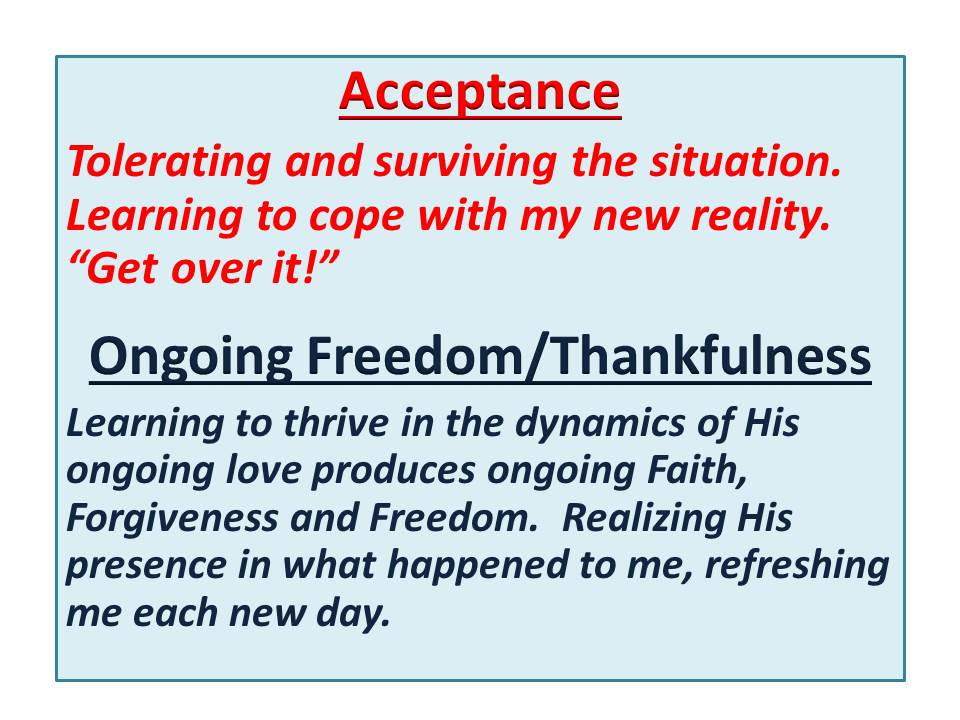STAGES OF GRIEF.....
The following power point presentation and commentary are adapted from Elisabeth Kubler-Ross' work regarding grief and loss. After observation and interviews with those who were diagnosed with a terminal illness, Kubler-Ross observed that these patients shared common thoughts and emotions shown over time. From this conclusion , Kubler-Ross proposed a process of grieving that involved five identifiable stages. See the first "power point" slide shown below for these five stages.
The early understanding of these stages proposed that one stage followed another. More recently this has changed to propose that a person may move back and forth through the stages at any given time in the healing process.
These stages of grief will be mentioned in various areas of Comfort.Guide. As we move through these stages, we will present the process by which comfort can be received in the midst of that stage. Our goal is simple: to help you receive comfort in all these stages, so that your thoughts and emotions are healed. And finally, we want to move beyond the last stage (Acceptance) to a God-given comfort-based awareness of hope and well being!
There are five stages of grief. In the first stage of grief and loss, "Denial", your rational thinking part of your brain is shutting down. The survival part of your brain, the limbic system, is taking charge. Chemicals are being activated throughout your body that move you into flight (running away), fight (anger) or shut down (numbness). It is experienced often as a confusing numbness, with thoughts of disbelief and resistance. Thoughts like: "I won't talk about this and it will go away"; "This can't be happening to me"; or "This is just a nightmare and will go away soon". We want to emphasize that crying out in pain is quite different from crying out "HELP!" in a safe place to a safe Person.
The early understanding of these stages proposed that one stage followed another. More recently this has changed to propose that a person may move back and forth through the stages at any given time in the healing process.
These stages of grief will be mentioned in various areas of Comfort.Guide. As we move through these stages, we will present the process by which comfort can be received in the midst of that stage. Our goal is simple: to help you receive comfort in all these stages, so that your thoughts and emotions are healed. And finally, we want to move beyond the last stage (Acceptance) to a God-given comfort-based awareness of hope and well being!
There are five stages of grief. In the first stage of grief and loss, "Denial", your rational thinking part of your brain is shutting down. The survival part of your brain, the limbic system, is taking charge. Chemicals are being activated throughout your body that move you into flight (running away), fight (anger) or shut down (numbness). It is experienced often as a confusing numbness, with thoughts of disbelief and resistance. Thoughts like: "I won't talk about this and it will go away"; "This can't be happening to me"; or "This is just a nightmare and will go away soon". We want to emphasize that crying out in pain is quite different from crying out "HELP!" in a safe place to a safe Person.
The survival mode of denial and numbness will move quickly towards our natural alarm system, which is experienced as "Anger". Often we can become trapped in the anger stage of grieving. Anger can be experienced as physically and mentally energizing as the fight/flight/shut down chemicals for survival are activated. This can bring a false sense of control and numbing.
At this "Anger" stage, in order to receive comfort we need tools for "deactivating" the flight/fight/shut down reaction. As that deactivation process occurs by intentionally quieting the nervous system, you can hear your wounded self believing: "I'm afraid ... I'm worthless ... I'm alone ... and there is no future for me". But you will also begin to hear God telling you, "Although these thoughts are strong, the real truth is .....", and a sense of safety will be reestablished. Comfort.Guide will help with frequent invitations to Pause, Reflect, Receive. Additional tools are also presented in the "How to Use" and "Toolkit" pages.
At this "Anger" stage, in order to receive comfort we need tools for "deactivating" the flight/fight/shut down reaction. As that deactivation process occurs by intentionally quieting the nervous system, you can hear your wounded self believing: "I'm afraid ... I'm worthless ... I'm alone ... and there is no future for me". But you will also begin to hear God telling you, "Although these thoughts are strong, the real truth is .....", and a sense of safety will be reestablished. Comfort.Guide will help with frequent invitations to Pause, Reflect, Receive. Additional tools are also presented in the "How to Use" and "Toolkit" pages.
At the next stage, "Bargaining", rational thoughts are flowing; however, the plan that develops is often associated with plans to try harder, or "fix" things, things that you cannot control. At this stage, in order to receive true comfort, there is a need to be open to hear thoughts that are inspired and a plan based on truth. The awareness of the differences is developed through the practice of discernment, meditation and mindfulness.
During this stage, "Withdrawal and Depression" go hand and hand. With loss, it is natural to experience various levels of depression. In order to receive comfort during this stage a mindful attachment to others, as well as to God's love, are the healing balms to the raw pain within. This is where Jesus invites us to enter into His presence, telling us that He has experienced the same pain as we are going through. He is safe, and longs to bring us comfort. He is the "God of all Comfort". Receiving this comfort is a chosen journey, not a "I should just get over it" experience.
This final stage of "Acceptance" can be experienced as the passage of time makes loss become a distant memory; life moves on. However, an ongoing "echo" of the loss may painfully occur at any time. Actively receiving comfort in the midst of loss can bring an acceptance that involves surrendering the hurt to the God of all Comfort. He who experienced all we have experienced has a plan and a will to bring all things together for good. It is from His perspective that our loss can be rewritten into hope.
Credit: http://www.ekrfoundation.org/five-stages-of-grief/.
Credit: http://www.ekrfoundation.org/five-stages-of-grief/.
To help you make this personal here is a Worksheet for your use.
At what stage of the grieving and healing process do you feel you are in?
* I find myself in DENIAL: this can be experienced as a sense of detachment and numbness from your feelings, and others.
* I find myself ANGRY: this can be experienced as an overall agitation, irritability and aggressiveness. You may find yourself surprised at your over reaction to the smallest irritation in your daily life. This can lead to overall fatigue and difficulty sleeping.
* I find myself in BARGAINING AND CONTROL: this can be experienced as hyper-vigilant problem solving to fix and change the situation.
* I find myself in WITHDRAWAL: this stage can be experienced as isolating from social interaction. You may experience a difficulty enjoying activities that at one time you found rewarding and refreshing.
* I find myself HOPELESS and SHUT DOWN: this stage can be experienced as resignation to what is perceived as inevitable.
As you pause and reflect on the above information, identify the stage(s) you are experiencing. You will want to perhaps journal and reflect on how you are personally experiencing this grief process.
Now that you have finished the worksheet, its a great time to talk with Jesus about what has become more clear to you. As you do this, remember that He is with you, He sees you, He hears your call for help, He understands you with deep empathy, and His heart of Love intervenes to work all things together for good.
And a good conversation goes both ways, so be sure to then listen for all the insights He has for you! He will make the Scriptures you need come alive, He may use songs, He may use images, He may use "word-pictures", etc., all prepared especially for you and only you at this time of your healing and growth!
Click HERE to return to "Week 5 Outline".
Click HERE to go to "Week 6 Outline".
At what stage of the grieving and healing process do you feel you are in?
* I find myself in DENIAL: this can be experienced as a sense of detachment and numbness from your feelings, and others.
* I find myself ANGRY: this can be experienced as an overall agitation, irritability and aggressiveness. You may find yourself surprised at your over reaction to the smallest irritation in your daily life. This can lead to overall fatigue and difficulty sleeping.
* I find myself in BARGAINING AND CONTROL: this can be experienced as hyper-vigilant problem solving to fix and change the situation.
* I find myself in WITHDRAWAL: this stage can be experienced as isolating from social interaction. You may experience a difficulty enjoying activities that at one time you found rewarding and refreshing.
* I find myself HOPELESS and SHUT DOWN: this stage can be experienced as resignation to what is perceived as inevitable.
As you pause and reflect on the above information, identify the stage(s) you are experiencing. You will want to perhaps journal and reflect on how you are personally experiencing this grief process.
Now that you have finished the worksheet, its a great time to talk with Jesus about what has become more clear to you. As you do this, remember that He is with you, He sees you, He hears your call for help, He understands you with deep empathy, and His heart of Love intervenes to work all things together for good.
And a good conversation goes both ways, so be sure to then listen for all the insights He has for you! He will make the Scriptures you need come alive, He may use songs, He may use images, He may use "word-pictures", etc., all prepared especially for you and only you at this time of your healing and growth!
Click HERE to return to "Week 5 Outline".
Click HERE to go to "Week 6 Outline".
